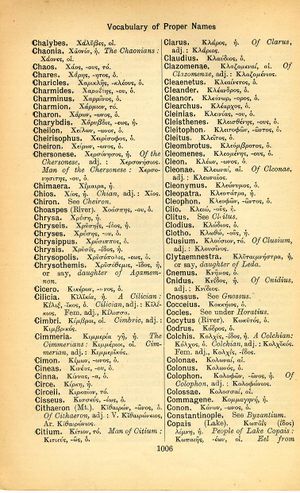Clytaemnestra
Ἴσον ἐστὶν ὀργῇ καὶ θάλασσα καὶ γυνή → Mulier et mare sunt isdem plane moribus → In ihrem Naturell sind Frau und Meerflut gleich
English > Greek (Woodhouse)
Κλυταιμνήστρα, ἡ, or say, daughter of Leda.
Latin > English (Lewis & Short)
Clytaemnēstra: (Clytemnēstra, Liv. Andron. 11 Rib.; mutilated into Cly-temēstra, Cass. Hemin. ap. Serv. ad Verg. A. 7, 631; hence the second syllable short in Aus. Epit. Her. 1, 1, 4), ae, f., = Κλυταιμνήστρα,
I the daughter of Tyndarus and Leda, and sister of Helen, Castor, and Pollux; wife of Agamemnon and mother of Orestes, Iphigenia, and Electra; she, with her paramour, Aegisthus, murdered her husband on his return from Troy, and was on that account put to death by her son Orestes, Hyg. Fab. 117 and 240; Serv. ad Verg. A. 2, 601; 3, 331; 4, 471; Auct. Her. 1, 10, 17; 1, 16, 21; Cic. Inv. 1, 13, 18; Ov. Am. 1, 7, 9; id. Nux, 26.—
II As title of a tragedy of Attius, Cic. Off. 1, 31, 14; id. Fam. 7, 1, 2 al.—
B Appellative for an unfaithful wife, Cael. ap. Quint. 8, 6, 53.
Latin > French (Gaffiot 2016)
Clўtæmnēstra, æ, f. (Κλυταιμνήστρα),
1 Clytemnestre [femme d’Agamemnon : Cic. Inv. 1, 18
2 [fig.] femme qui tue son mari : Juv. 6, 656 || femme impudique : Cæl. d. Quint. 8, 6, 53.

